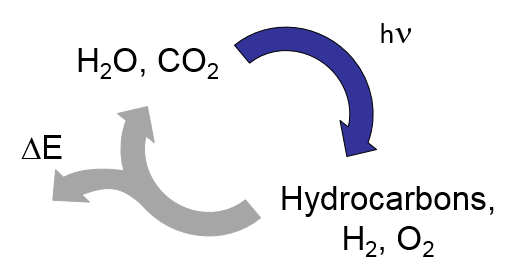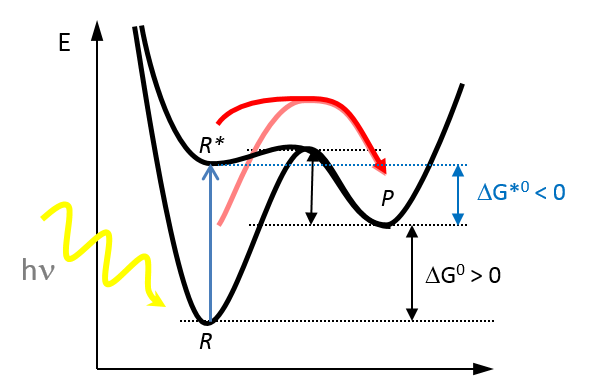Inhaltsbereich
Hauptseminar: Green Energy Seminar – Overview
- Overview
Seminar: Solar Cells to Solar Fuels - from basics to applications (Master/Diploma)
Lecturer
About the lecture
Time and place
Wednesdays 15:45 - 17:15 pm CET, Zoom (online) meetings upon invitationRising atmospheric levels of carbon dioxide and the depletion of fossil fuel reserves raise serious concerns about the ensuing effects on the global climate and future energy supply. Utilizing the abundant solar energy to produce electricity or to drive artificial photosynthetic reaction to convert water and carbon dioxide into fuels are potential solutions to both energy harvesting and storage. The Seminar will cover five main topics. Firstly, the current status of the research in batteries will be discussed, together with the role of the batteries in balancing the electricity grid and the impact on the grid architecture. The second part will cover solar cells: architecture, light harvesting, charge separation, efficiency limitations, new materials and methods to overcome the Shockley-Queisser limit.
 The third part will cover efficient light emission based on inorganic and organic nanoparticles. The fourth part will focus on the passive radiative cooling to eliminate the need for energy consuming current air conditioning approaches. The last, extensive, part will cover natural photosynthesis, in particular light harvesting and charge transport. The fourth part will focus on heterogeneous solar fuel generation with nanocrystalline semiconductor particles, starting from thermodynamic and kinetic aspects of photocatalysis, through photosensitization to semiconductor-based photocatalysts for hydrogen generation via water reduction, full water splitting and carbon dioxide reduction. The architecture, limitations and figures of merit for photocatalytic and photoelectrocatalytic systems will also be discussed.
The third part will cover efficient light emission based on inorganic and organic nanoparticles. The fourth part will focus on the passive radiative cooling to eliminate the need for energy consuming current air conditioning approaches. The last, extensive, part will cover natural photosynthesis, in particular light harvesting and charge transport. The fourth part will focus on heterogeneous solar fuel generation with nanocrystalline semiconductor particles, starting from thermodynamic and kinetic aspects of photocatalysis, through photosensitization to semiconductor-based photocatalysts for hydrogen generation via water reduction, full water splitting and carbon dioxide reduction. The architecture, limitations and figures of merit for photocatalytic and photoelectrocatalytic systems will also be discussed.
The seminar addresses in particular master students which have followed the lecture Advanced Solid State Physics (EM1) or Optoelectronics, but is not exclusively for these students.

Seminars
The seminars will start in an online format, with presentations given by the students via Zoom.
The first seminar, on 14.04.2021 will be an introductory one, with a presentation explaining the content and format of the course. This first seminar will start at 15:15, later seminars start at 15:30.
Planned topics
Here are the sugested topics. The assignment of the topic is now available.
1. Electricity grid, renewable vs non-renewable source – 21.04.2021)
2. Batteries (Li ion, Li-O, Li-S) – 28.04.2021
3. Silicon solar cells, case study of solar panel use – 05.05.2021
4. Thin film and organic solar cells – 12.05.2021
5. Perovskite solar cells – 19.05.2021
6. Overcoming Shockley-Queisser limit (upconversion, triplet-triplet annihilation) - 26.05.2021
7. Overcoming Shockley-Queisser limit (multiexciton generation, singlet fission) - 02.06.2021
8. Efficient light emission: quantum dots and carbon dots - 09.06.2021
9. Nighttime photovoltaic cells and IR emission - 16.06.2021
10. Radiative cooling - 23.06.2021
11. Natural photosynthesis and lessons to be learned - 30.06.2021
12. Photocatalytic H2 generation and water splitting - 07.07.2021
13. Photocatalytic CO2 reduction - 14.07.2021
Students are encouraged to provide a list of preferred topics for their presentation. By default, there will be 2 talks per seminar. If more than 24 students enrol for the seminar, additional topics will be proposed and selected seminars will have 3 talks.
The seminar will be credited if:
(a) a presentation is given,
(b) all presentations (missing 3 at most) have been attended,
(c) the student actively participated in discussions
Tutors:
Dr. Jacek Stolarczyk, email: jacek.stolarczyk(at)physik.uni-muenchen.de
Prof. Dr. Jochen Feldmann, email: feldmann(at)lmu.de
Verantwortlich für den Inhalt: Jacek Stolarczyk
